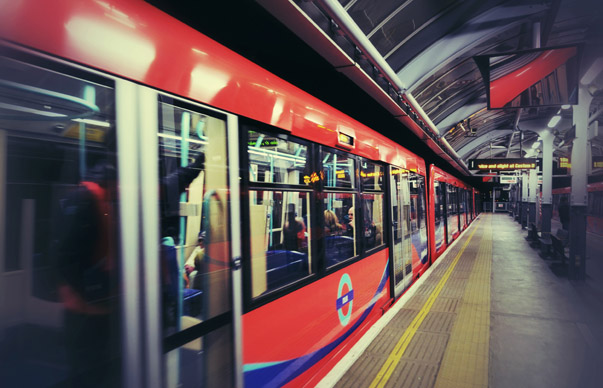A 24-hour walkout by members of four trade unions has closed the London Underground network completely, bringing gridlock to parts of the capital.
Both the unions and Transport for London are claiming that the strike could have been avoided. Each blames the other side for failing to reach an agreement on pay and working conditions ahead of a planned move to a 24-hour service.
Reaction from Londoners have been mixed, with some suggesting that tube drivers earn too much anyway, and others sympathetic to their concerns about having to work all night.
What are the facts?

How much do Tube drivers earn?
A newly-qualified London Underground train operator can expect to earn £49,673 a year. That’s for a 36-hour week with 43 days off a year.
 Is that a lot? As so often, it’s a question of context.
Is that a lot? As so often, it’s a question of context.
It’s true that this is a higher starting salary than newly qualified nurses (from £21,692 plus £3,448 to £6,279 in London), teachers (£27,543 in Inner London), Met police officers (£22,443 to £36,254 plus £6,663 London allowance) and other public sector workers get.
On the other hand, there’s little possibility of career development: Tube drivers tend to stay on the same basic salary, whereas a police constable who rises to the rank of inspector might double his or her pay.
Union officials tell there is little chance of a driver earning overtime – unlike a police officer – and the hours are always unsociable: most drivers will either work an early shift, where you might have to get up at 3am, or a late shift, which means getting home in the early hours.
A London Underground driver gets about the same as train drivers on other networks: Chiltern pay £49,000, London Midland £50,000 and C2C £45,000.
In any event, the unions says this dispute is not really about pay – it’s about work/life balance, as drivers fear being forced to work even more unsociable hours when the Night Tube is launched.
Whose fault is this strike?
It’s been a feature of virtually every industrial dispute since the construction of the great pyramids that each side blames the other for failing to avert a strike, and this is no exception.
The main train drivers’ union, Aslef, says Transport for London (Tfl) only came up with an offer on pay and conditions at the 11th hour – Monday afternoon, to be precise.
These were the terms offered to drivers:
- an average increase on basic salary of 2 per cent made up of a 1 per cent pay rise and a flat £500 increase in base pay
- an increase of RPI or 1 per cent (whichever is greater) in pay for 2016 and 2017
- £500 launch bonus to all staff on the Night Tube lines and stations
- £2,000 transition bonus for train operators where transitional arrangements apply
TfL also says it has ruled out unlimited working hours and want drivers to work an “average of seven night shifts a year”.
And London Underground’s boss Steve Griffiths has said: “No-one will have to work more hours than they do now, and we have a longer-term plan, which will mean no-one will need to work nights if they don’t want to.”
Aslef says TfL only put this offer on the table at 2.30pm on Monday and withdrew it at 6.30pm.
The union says this four-hour window did not leave enough time for its negotiators to put the offer to members and was “designed to be turned down”.
TfL insists that the offer was left open later than 6.30pm on Monday and is still up for negotation.
But Aslef says it has some documentary evidence that proves underground bosses were being intransigent. FactCheck was given this photo of the TfL document outlining the pay offer:

The document states pretty clearly: “This offer is time bound and if the conditions are not accepted by 18.30 today the offer will be withdrawn.”
TfL told us: “Despite the wording… we didn’t withdraw the offer. The unions told us they need more time to consider it so we talked to the unions until 10pm on Monday, with that offer on the table.”
“We made clear that deal was still on the table, it still is and the unions should come and talk to us about it.”
Further, Tfl says it tried repeatedly to negotiate from 24 June – a week after the strike ballot – but on several occasions union officials said they were unavailable, walked out of meetings and refused to talk about key issues.
We understand that the union disputes the truthfulness of some of this, but it’s difficult to see how we’ll ever get to the bottom of what really happened behind the closed doors of the negotiations.
Driverless trains?
Some commentators are calling for the introduction of driverless trains as a permanent solution to the problem of industrial action.
It’s true that various kinds of automated trains exist in many cities – including London – but usually still require some kind of operator.
Trains on the capital’s Docklands Light Railway don’t require drivers but still have staff on board to operate the doors and deal with emergencies.
DLR train operators get paid less than Underground train drivers, but many DLR staff are union members and have voted for industrial action in the past.
The Underground’s Victoria, Northern, Jubilee and Central Lines are partly automatic but again, operators control the doors and perform other tasks.
TfL says it wants its next generation of tube trains to be automated too, but staff will still be on board. Many will also presumably be union members too, so the change in technology won’t rule out the prospect of more strikes.




